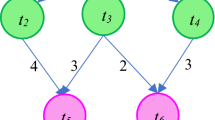Abstract
A scientific workflow is modeled as a Directed Acyclic Graph where the nodes represent individual tasks and the directed edges represent the dependency relationship between two tasks. Scheduling a workflow to achieve certain goal(s) (e.g.; minimize makespan, cost, penalty, and energy; maximize reliability, processor utilization, etc.) remains an active area of research. In this paper, we propose an efficient scheduling algorithm for workflows in heterogeneous multi-processor systems that takes into account makespan, energy consumption, and reliability. We name our methodology as Wait Aware Normalized Metric Scheduling (henceforth mentioned as WANMS). The proposed approach is a list scheduling algorithm consisting of two phases namely, Task Ordering and Allocation. In the task ordering phase, it tries to find out an optimal ordering of the tasks based on the maximum execution cost starting from the current node. In the allocation phase, a task is assigned to a processor based on a normalized linear combination of finish time of the tasks and reliability or based on energy depending on the wait time of the task. Additionally, WANMS is designed in such a way so that it can satisfy any given reliability constraint while minimizing makespan and energy. The proposed algorithm has been analyzed to understand its time and space requirements. Experimental evaluations on the real-world and randomly generated workflows show that WANMS dominates state-of-the-art algorithms in terms of both makespan and energy in most cases and at least one objective in the rest of the cases. In particular, we observe that for high reliability constraints the schedule produced by WANMS Algorithm leads to up to \(18 \%\) improvement in makespan and \(13 \%\) improvement in energy on an average compared to the existing algorithms.
Access this chapter
Tax calculation will be finalised at checkout
Purchases are for personal use only
Similar content being viewed by others
References
Capota, E.A., Stangaciu, C.S., Micea, M.V., Curiac, D.I.: Towards mixed criticality task scheduling in cyber physical systems: challenges and perspectives. J. Syst. Softw. 156, 204–216 (2019)
Chang, W., Pröbstl, A., Goswami, D., Zamani, M., Chakraborty, S.: Battery-and aging-aware embedded control systems for electric vehicles. In: 2014 IEEE Real-Time Systems Symposium, pp. 238–248. IEEE (2014)
Dogan, A., Ozguner, F.: Matching and scheduling algorithms for minimizing execution time and failure probability of applications in heterogeneous computing. IEEE Trans. Parallel Distrib. Syst. 13(3), 308–323 (2002)
Farid, M., Latip, R., Hussin, M., Hamid, N.A.W.A.: Scheduling scientific workflow using multi-objective algorithm with fuzzy resource utilization in multi-cloud environment. IEEE Access 8, 24309–24322 (2020)
Huang, J., Li, R., Jiao, X., Jiang, Y., Chang, W.: Dynamic DAG scheduling on multiprocessor systems: reliability, energy, and makespan. IEEE Trans. Comput. Aided Des. Integr. Circ. Syst. 39(11), 3336–3347 (2020)
Kwok, Y.K., Ahmad, I.: Benchmarking and comparison of the task graph scheduling algorithms. J. Parallel Distrib. Comput. 59(3), 381–422 (1999)
Ma, Y., Zhou, J., Chantem, T., Dick, R.P., Wang, S., Hu, X.S.: Online resource management for improving reliability of real-time systems on “big-little” type MPSoCs. IEEE Trans. Comput.-Aided Des. Integr. Circ. Syst. 39(1), 88–100 (2018)
Shatz, S.M., Wang, J.P.: Models and algorithms for reliability-oriented task-allocation in redundant distributed-computer systems. IEEE Trans. Reliab. 38(1), 16–27 (1989)
Tang, X., Li, K., Qiu, M., Sha, E.H.M.: A hierarchical reliability-driven scheduling algorithm in grid systems. J. Parallel Distrib. Comput. 72(4), 525–535 (2012)
Topcuoglu, H., Hariri, S., Wu, M.Y.: Performance-effective and low-complexity task scheduling for heterogeneous computing. IEEE Trans. Parallel Distrib. Syst. 13(3), 260–274 (2002)
Xie, G., Chen, Y., Liu, Y., Wei, Y., Li, R., Li, K.: Resource consumption cost minimization of reliable parallel applications on heterogeneous embedded systems. IEEE Trans. Ind. Inf. 13(4), 1629–1640 (2016)
Xie, G., Chen, Y., Xiao, X., Xu, C., Li, R., Li, K.: Energy-efficient fault-tolerant scheduling of reliable parallel applications on heterogeneous distributed embedded systems. IEEE Trans. Sustain. Comput. 3(3), 167–181 (2017)
Xie, G., et al.: Minimizing redundancy to satisfy reliability requirement for a parallel application on heterogeneous service-oriented systems. IEEE Trans. Serv. Comput. 13(5), 871–886 (2017)
Zhao, B., Aydin, H., Zhu, D.: On maximizing reliability of real-time embedded applications under hard energy constraint. IEEE Trans. Ind. Inf. 6(3), 316–328 (2010)
Zhou, J., et al.: Security-critical energy-aware task scheduling for heterogeneous real-time MPSoCs in IoT. IEEE Trans. Serv. Comput. 13(4), 745–758 (2019)
Zhou, J., et al.: Resource management for improving soft-error and lifetime reliability of real-time MPSoCs. IEEE Trans. Comput. Aided Des. Integr. Circ. Syst. 38(12), 2215–2228 (2018)
Zhou, X., Zhang, G., Sun, J., Zhou, J., Wei, T., Hu, S.: Minimizing cost and makespan for workflow scheduling in cloud using fuzzy dominance sort based HEFT. Future Gener. Comput. Syst. 93, 278–289 (2019)
Author information
Authors and Affiliations
Corresponding author
Editor information
Editors and Affiliations
Rights and permissions
Copyright information
© 2023 The Author(s), under exclusive license to Springer Nature Switzerland AG
About this paper
Cite this paper
Tekawade, A., Banerjee, S. (2023). WANMS: A Makespan, Energy, and Reliability Aware Scheduling Algorithm for Workflow Scheduling in Multi-processor Systems. In: Molla, A.R., Sharma, G., Kumar, P., Rawat, S. (eds) Distributed Computing and Intelligent Technology. ICDCIT 2023. Lecture Notes in Computer Science, vol 13776. Springer, Cham. https://doi.org/10.1007/978-3-031-24848-1_2
Download citation
DOI: https://doi.org/10.1007/978-3-031-24848-1_2
Published:
Publisher Name: Springer, Cham
Print ISBN: 978-3-031-24847-4
Online ISBN: 978-3-031-24848-1
eBook Packages: Computer ScienceComputer Science (R0)




